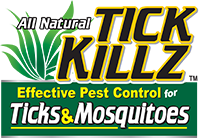Archives
Select Archives- March 2021
- July 2019
- June 2019
- May 2019
- March 2019
- February 2019
- January 2019
- November 2018
- October 2018
- September 2018
- July 2018
- June 2018
- May 2018
- April 2018
- March 2018
- February 2018
- January 2018
- December 2017
- November 2017
- October 2017
- September 2017
- August 2017
- July 2017
- June 2017
- April 2017
- March 2017
- February 2017
- January 2017
- December 2016
- November 2016
- October 2016
- September 2016

Ticks and mosquitoes, which are known to carry diseases that can be transmitted to humans, are called vectors. The number of known cases of “vector-borne” diseases in the United States has more than tripled since 2004. These cases include rising reports of Lyme Disease, West Nile Virus, Rocky Mountain Spotted Fever, Chikungunya and Zika Virus, all of which are primarily transmitted by ticks and mosquitoes.
Illnesses like these can be extremely harmful and debilitating, and in extreme instances even fatal. It has become increasingly important for families to take steps to better protect their property from these harmful insects.
The Center for Disease Control (CDC) is a tremendous resource for those trying to learn more about the hazards presented by ticks and the diseases they carry in the United States. You can visit them at https://www.cdc.gov/ticks/index.html. The Environmental Protection Agency (EPA) dedicates a section of its website to mosquitoes which you can find at https://www.epa.gov/mosquitocontrol.
Following is a list of 10 things you or your landscape or pest control professional can do to protect your property and keep your family safe:
1. Remove leaf litter
Ticks like to reside in leaf litter. This build up creates a warm and often moist environment for them where they won’t be disturbed. Unfortunately, leaf litter is also an attractive spot for children and pets to play giving ticks a great opportunity to latch on to a host. Removing leaf litter from your property will force those ticks to find somewhere else to live!
2. Clear tall grass and brush around home and edges of the lawn
Just like leaf litter, tall grass and brush create attractive accommodations for ticks and other pests. As your children and pets play and you landscape, garden or otherwise enjoy your property, you may pick up a few passengers as you approach the edges of your lawn which leads to step number three.
3. Create a 3’ wide barrier of wood chips/gravel around perimeter of lawn
In addition to clearing the wild areas at the edges of your lawn, it’s important to add a protective barrier devoid of any grass or landscaping to further protect your property from harmful insects. This barrier will help keep unwanted pests in the wild and away from you and your loved ones as you enjoy your yard.
4. Mow lawn frequently
Many people mow their lawn to make sure their home looks neat and tidy, create a comfortable play area and stimulate the growth of grass. However, an often overlooked reason for frequent mowing is to decrease your tick and mosquito populations. By keeping your grass shorter, your lawn becomes less attractive to these harmful pests.
5. Stack wood neatly and in a dry area
Wood piles attract rodents like mice, squirrels, chipmunks and groundhogs. These rodents are avid carriers of pests like ticks and fleas. Wood piles also retain moisture which attracts mosquitoes. Therefore, it’s important to neatly store your wood in a dry location.
6. Keep playgrounds, decks and patios away from yard edges and trees
Ticks and mosquitoes love tall grasses, leafy areas and dark or dank sites on your property. Keep the places where you and your children spend the most time out in the open with lots of air and sunlight.
7. Construct fences to discourage animals
Larger animals like deer, raccoon and bear are increasing in population in suburban and rural communities as they are continually being pushed further out of their natural habitats. These animals are huge carriers of ticks and fleas, so keeping them off your property will naturally reduce the number of pests encountering your family members.
8. Remove old furniture and trash from yard
Small rodents and ticks love to hide in old furniture and trash. These items also tend to retain water which can become a breeding ground for mosquitoes. Just one more reason to de-clutter your yard!
9. Add plants that repel insects
Herbs like lavender, mint and rosemary and flowers like marigolds are known to repel mosquitoes. A quick google search will yield many more varieties to try. While this approach does have some benefits, it certainly doesn’t mean that your yard will be pest free. Also, if you live in an area with a large deer population, it’s a good idea to research which plants are deer resistant. Not only will you be able to enjoy the plants longer, you’ll attract less deer to your property which means less ticks!
10. Treat your property with All Natural pest control products
One of the most effective ways to control the population of pests like ticks and mosquitoes found on your property is to spray a product or ask your lawn care or pest control professional to treat your property.
There are many products on the market. Most are made from chemicals and “all chemicals, including all pesticides, have the potential to be hazardous” per the National Pesticide Information Council. Visit http://npic.orst.edu/factsheets/WhatsMyRisk.html to read more about pesticide risks.
Fortunately, there are All Natural alternatives like TickKillz™ that have proven to be highly effective at controlling and repelling pests like ticks and mosquitoes. TickKillz™ is 100% natural and therefore safe for your children, pets and the environment.
Learn more at www.tickkillz.com or consult your local service provider and start protecting your property today!
